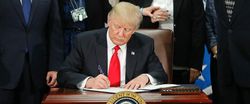Observers and students of state repression quite frequently ask about what is/is not included within the concept. There is also some interest in trying to demarcate whether something is domestic in orientation (either under American politics or comparative politics) or international. The new immigration order put forward by President Trump a few days ago reveals that there are some policies that are all of these things.
As I stated in my review of the repression literature a few years ago (State Repression and Political Order):
By most accounts, repression involves the actual or threatened use of physical sanctions against an individual or organization, within the territorial jurisdiction of the state, for the purpose of imposing a cost on the target as well as deterring specific activities and/or beliefs perceived to be challenging to government personnel, practices or institutions (Goldstein 1978, p. xxvii). Like other forms of coercion, repressive behavior relies on threats and intimidation to compel targets, but it does not concern itself with all coercive applications (e.g., deterrence of violent crime and theft). Rather, it deals with applications of state power that violate First Amendment–type rights, due process in the enforcement and adjudication of law, and personal integrity or security.
First Amendment–type rights include (Goldstein 1978, pp. xxx–xxxi):
- Freedom of speech, assembly, and travel. Freedom of the press up to a very narrowly defined “clear and present danger” point, regardless of the views communicated.
- Freedom of association and belief without governmental reprisal, obloquy, or investigation unless clearly connected with possible violations of existing laws.
- The general freedom to boycott, peacefully picket, or strike without suffering criminal or civil penalties.
Within this context, the current ban is "repressive" in that it uses the actual or threatened use of physical sanctions against individual or organization (i.e., forced detention) and the threat of such (e.g., incarceration, removal from the country). This is taken against people from the United States in order to influence individual behavior as well as the expression of beliefs. Now, the activities might not seem that problematic as they are presumably to counter terrorism but it is not clear exactly how the US government would know this and the criteria for a terrorist has never been provided. In a sense, the activities here would simply be more indiscriminate than they would be selective. I am presuming that deep "vetting" (discussed by President Trump) would only be able to reveal associations and prior actions. It is not clear how this would be figured out however. Additionally, there has been no discussion of reading into people's brains/minds and/or gauging future activity like in the Minority Report with Tom Cruise. If the precision of the crime and its detection could be established, then this would fall outside the parameters of state repression. The open-ended nature of the designation is key.
While attempting to influence people living in the country (e.g., green card and visa holders) is clearly within the domain of state repression, the attempted influence of people from other countries is a different matter. The latter makes the action international and I will leave the proper designation/label to those that have interest in such things. I just highlight that it is not what we common think of as state/political repression. Perhaps we need to start using the phrase "international state repression" to designate such behavior (couldn't help myself). Perhaps IR and American colleagues should work this out so we have an idea what each is talking about.
The complexities from the ban are clearly worthy of attention. For example, they reveal how actions from a single political authority can simultaneously have both domestic and foreign implications. They reveal how actions from a single political authority can prompt both behavioral challenges both within the relevant territorial jurisdiction as well as across different territorial jurisdictions. Regarding the former (a frequently neglected aspect of democratic governance), it will be interesting to figure out why certain airports engaged in dissident activities while others did not. It will be interesting to figure out how tactics were selected (e.g., marches, sit-ins, shut-downs) and which ones were considered but not employed. It will be interesting to figure out whether the places that put forth behavioral challenges at the airports are the same places where protest normally kicks in.
It is also interesting that the actions of the executive have prompted still other aspects of democracy to take action (e.g., civil society organizations like the ACLU and the Federal District court). Indeed, the swiftness with which the initial legal actions were taken, the court respond and the action countered was quite something. That said, the ban is said to still be in effect. This should prompt investigations into what repressive actions could be countered by what strategies and also what sequence of actions need to undertaken to stop policies before they are enacted, monitor the actions as they are rolled out, halt them after they are underway as well as counter-act spinoff repressive policies that emerge after the first one.
Clearly the ban has issued a call to action across various divides but it is also a call to build intellectual bridges as well. The ban prompts Americanists, IR scholars and Comparativists to communicate with one another. It prompts people with interests in the subfields of contentious politics, state repression and political democracy to communicate with one another. The ban also prompts political scientists to talk with sociologists, legal scholars, public policy experts, communication scholars, anthropologists, historians and a whole list of people. In short, democracy is about to get a run for its money folks. Strap yourselves in for a wild one.

 RSS Feed
RSS Feed
